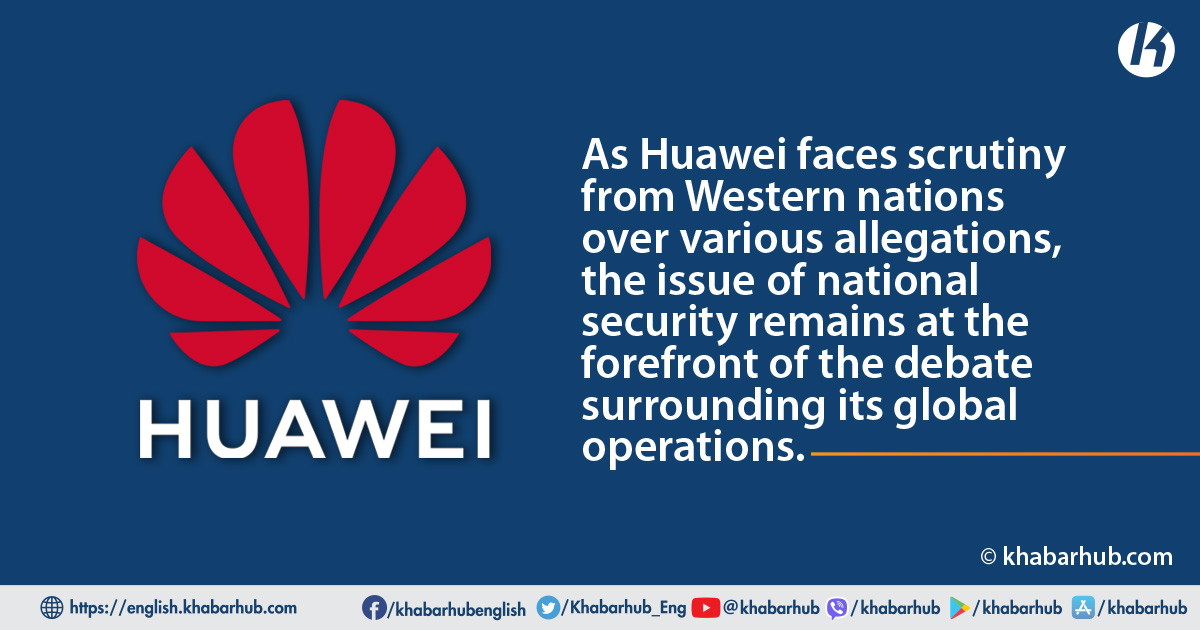Despite being labeled a security risk by the U.S. and European governments, Huawei, the Chinese telecom giant, is conducting 5G testing in Nepal with little transparency, raising concerns about its potential monopoly in the country’s telecom sector.
It is testing 5G technology opaquely in Nepal using a frequency of 2600 MHz, with suspicions that it aims to establish a monopoly in Nepal’s telecom sector.
This has raised concerns among authorities and triggered an investigation by the Commission for the Investigation of Abuse of Authority (CIAA) over potential corruption issues.
Since it under scrutiny for its alleged involvement in bribery and clandestine operations worldwide, the issue of national security remains a significant concern in its global expansion efforts.
As the company faces allegations of intellectual property theft and espionage in several countries, the issue of national security remains a significant concern in its global expansion efforts.
Additionally, Huawei’s business dealings have led to bans in certain countries and investigations by international authorities.
The U.S. and European governments have previously labeled Huawei as a security risk due to concerns about state influence and the potential vulnerability of its fifth-generation networks.
The West’s concerns about Huawei and ZTE stem from China’s national intelligence law, which could potentially enable backdoor access for spying or sabotage purposes.
This has also led to objections from countries like India, which have raised red flags against deploying Huawei gear in their own 5G mobile networks.
The company has faced multiple accusations of bribery and corrupt practices worldwide.
In Algeria, the company’s executive was convicted of bribery, resulting in a ban on Huawei from bidding for public contracts.
Similarly, investigations are ongoing in Zambia, where the company is accused of attempting to secure an expensive contract to build cell towers in rural areas through bribery.
Even in the Solomon Islands, Huawei was caught offering millions of dollars to the ruling party in exchange for an undersea fiber-optic cable contract.
This incident, along with several others in recent years, has raised serious concerns about the company’s business ethics.
Western nations have scrutinized the telecom company, not only for alleged bribery and corruption but also for intellectual property theft and espionage.
These allegations add to the concerns surrounding the company’s involvement in sensitive and critical sectors worldwide.
Major Western countries such as the U.S., Australia, and New Zealand have deemed Huawei a national security threat, leading to a ban on the company’s involvement in their state-of-the-art 5G telecom networks while others are considering similar actions.
Meanwhile, recent charges by U.S. prosecutors highlight the company’s violations of sanctions, trade secrets theft, and encouragement of intellectual property theft.
Beyond security threats, Huawei has faced numerous corruption investigations in over 20 countries, raising questions about the company’s business practices.
The ban reflects concerns about potential tracking of forbidden information by Huawei and other Chinese telecom equipment providers.
Amid the focus on national security, the company’s involvement in business dealings has largely been overlooked despite the fact that the company has denied these allegations, claiming to have strong safeguards against corporate graft and enforcing a “zero-tolerance” policy on corruption.
With business operations spanning over 170 countries, Huawei it ranked as the second-largest manufacturer of smartphones and tablets worldwide last year.
It may be recalled that Huawei’s chief financial officer, Meng Wanzhou, was arrested in Canada on charges of violating U.S. sanctions on Iran.
The company rejected these charges and denied espionage allegations. In response to concerns, Huawei emphasized that any malicious behavior would be noticed and detrimental to its business.
Huawei and its smaller Chinese rival, ZTE, too, have faced corruption investigations in around 21 countries in the past 12 years.
Among these cases are allegations of bribery, illegal donations to political parties, and questionable business practices in African countries, including Algeria and Ghana. Notably, the transaction costs of these corrupt deals are estimated to be in the billions.
Recently, Poland arrested a Chinese Huawei employee and a Polish national involved in cyber-business on charges of spying.
The incident adds to Western countries’ concerns about potential backdoors in Huawei’s equipment, possibly allowing government espionage.
In one case, the Alliance for Accountable Governance revealed that the company funded millions of dollars worth of campaign paraphernalia for a ruling party’s election campaign in exchange for a $150 million contract to build an e-government platform.
Huawei’s challenges are vast as it grapples with international security concerns while facing accusations of corruption and unethical business practices.
It also faced scrutiny over security concerns as it got embroiled in a data breach controversy in Africa.
The West’s concerns about Huawei and ZTE stem from China’s national intelligence law, which could potentially enable backdoor access for spying or sabotage purposes.
It also faced accusations of a major data breach in Africa, raising doubts about its claims of no evidence supporting national security concerns.
The African Union’s confidential data was allegedly sent to Shanghai every night for five years, leading to the replacement of some technology infrastructure.
Bugs were also discovered in the building in Addis Ababa, further adding to the controversy.
In other instances, Huawei was also linked to corruption allegations. In one case, the Alliance for Accountable Governance revealed that the company funded millions of dollars worth of campaign paraphernalia for a ruling party’s election campaign in exchange for a $150 million contract to build an e-government platform.
Reports are that the telecom’s claims of compliance with laws and transparency have proved to be disingenuous.
On the contrary, it has been found to be rewarding employees for obtaining confidential information from competitors.









Comment